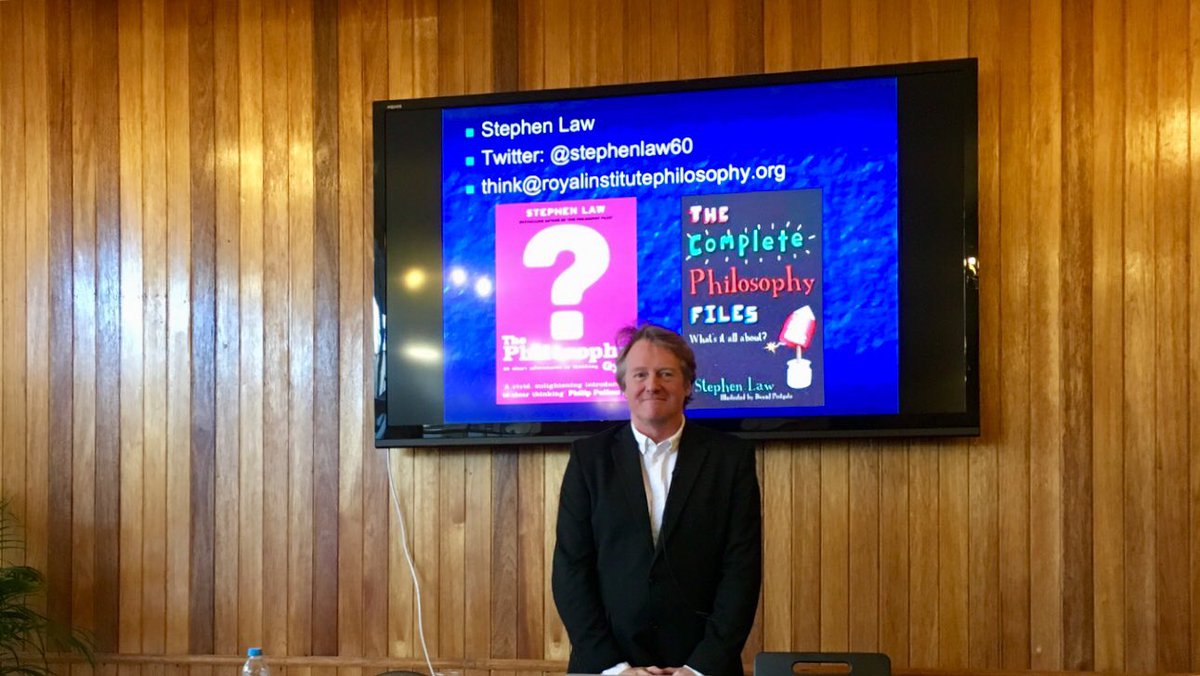Nov 17 - Stephen Law On Bullshit, Truth And Critical Thinking - YGTV Interview
 Philosopher Stephen Law spoke at the John Mackintosh Hall earlier today as part of this year’s Gibraltar Gibunco International Literary Festival. YGTV caught up with him after the talk to speak about the notion of bullshit and the importance of thinking for oneself.
Philosopher Stephen Law spoke at the John Mackintosh Hall earlier today as part of this year’s Gibraltar Gibunco International Literary Festival. YGTV caught up with him after the talk to speak about the notion of bullshit and the importance of thinking for oneself.
YGTV: What’s it like being in Gibraltar for the Literary Festival? Is this your first time here?
Stephen Law: I’ve never been to Gibraltar before but I was so pleased to be invited. I’ve always been curious about Gibraltar since a family holiday I took in Spain. We were driving around in the hills and we looked down on Gibraltar and it looked absolutely amazing from a distance sticking out of the sea like that. It’s a very strange mixture of bits of Britain and other things.
YGTV: Your book “Believing Bullshit” was actually published before the notion of bullshit enjoyed its current resurgence, especially in conversations about Trump and Brexit and fake news…
SL: Yes, it’s almost as if I was prescient. The financial crisis was going on at the time and I though about including something on bullshit economics in the book but I didn’t go into it. But now as you say it’s become topical with internet echo chambers, fake news and Trump’s bullshitting. It’s clearly something people are interested in and they can see it’s potentially poisoning our intellectual and cultural environment and it is potentially quite dangerous - we do need to be good bullshit detectors, we need to know what the warning signs are.
YGTV: Are we worse off now? Do the two political shocks of last year - Brexit and Trump - indicate that we’re more likely to believe bullshit?
SL: I’m not sure whether the bullshit has got worse but I think that the current situation is so much more volatile now - electorates are so much more volatile - that it’s hard to predict what’s going to happen. We’ve had the mind of Western electorates being poisoned by the drip, drip, drip of bullshit particularly of the kind peddled by Fox News and the Daily Mail where they just endlessly repeat highly emotional claims about minorities. That’s always been there - the situation now is that, having been subjected to that for so long, and given the powder keg situation politically, there is a real risk that a large chunk of the British population, for example, will move in a pretty horrendous direction.
YGTV: In your talk you urged people to think for themselves and use their critical faculties but often it is these voters, people who, because of their socioeconomic status or lack of educational opportunities, cannot easily exercise such skills - how would you apply your advice to communities where there is little critical engagement with the world?
SL: I think we should get some bullshit immunity built into people from a young age. One way to do that is to expose young people in school to critical thinking and philosophy and so on. That will give them some ability to spot when they’re being bullshitted, some ability to spot when they’re being emotionally manipulated and an ability to spot a fallacious argument. We can get them to spot when someone is running an ad hominem attack against somebody, for example, which is a very popular newspaper strategy.
YGTV: You said in your talk that reason and argument would be the best methods when forming and sharing beliefs because they track the truth but why should we be interested in the truth in the first place? Why wouldn’t it be ok to believe false things that worked or kept us happy?
SL: As a philosopher I’m interested in truth and in what is true. I’d rather believe what’s true even if it’s inconvenient and even if it’s something frightening or unpleasant - I’d still rather know the truth. Actually, I think most people feel that way and, if they feel that way, my advice is to rely on reason and apply their intelligence as best as they can. Of course, there might be people who say “I don’t care what’s true; I believe what I want” but surely those people are very few and far between. A further point is that, if you’re not truth-sensitive, you are at the mercy of other people who will exploit you and manipulate you. If you’re unable to tell what’s true and what’s not, you’ve potentially made yourself a victim and it could be very bad news for you.
Check out Stephen's blog: http://stephenlaw.blogspot.com

{fcomment}
Latest News
- Giovanni Origo Budget Speech 2025 - GSD Shadow Minster for Youth, Tourism, the Environment and Transport
- Budget 2025 Speech by Minister for Industrial Relations, Civil Contingencies and Sport, Leslie Bruzon
- HM Customs Gibraltar Launches ASYCUDA Version 4.4 to Modernise Border Management
- Budget 2025 Speech by Minister for Equality, Employment, Culture and Tourism Christian Santos
- Declaration Of Enlistment By Royal Gibraltar Police Recruits
- Local Actors Travel To UK Drama Festival
- Bridge House Charitable Trust Welcomes Donations
- GSD Says Principal Auditor Report 2018/19 Should Now Emerge
- The Budget 2025 – Minister Gemma Arias-Vasquez's Address
- Ministry Of Equality Marks Successful End Of The Sixth Cycle Of The Women’s Mentorship Programme



